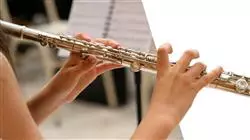University certificate
The world's largest faculty of humanities”
Description
This postgraduate certificate will allow you to delve into all the history related to the Roman School of Palestine and the parody masses"

Researching on the historical principles of musical aesthetics, it can be found that the longest study on this subject is found in the essay "On the beautifully musical", written in 1854 by Eduard Hanslick. Therefore, it can be said that the analysis of music and its aesthetics has been present among the activities of human beings for centuries and that, throughout history, its methodology and uses have been changing.
When analyzing a composition and its aesthetics, for example, there are several issues to address, such as the elements that the piece to be studied has: rhythm, melody or texture among others, the form-generating procedure: repetition, contrast and development, and even the structural elements of the musical form. All these concepts must be known and mastered by the musicology professional. Nowadays, for cinema, as well as advertising and the media, the history of music, as well as its aesthetics and its compositions are fundamental. That is why professionals in this branch of musicology are in such high demand by private and public companies, as they are experts who require a high level of skills and abilities.
For this reason, TECH has created this 300-hour program in which it has unified the most relevant and useful contents of the subject in a 100% online syllabus. Throughout the program there will be an extensive review of all the relevant musical periods, with an analysis through practical and simulated cases of special utility. The multidisciplinary nature of both theory and practice, together with the ease of access to these, taking into account that only a device with an Internet connection is needed, makes the degree extremely convenient and flexible for those enrolled. Also, thanks to the Relearning method, learning is done in a gradual and progressive way, so it ends up being a comfortable and natural process.
Dominate elements of the musical language like the rhythm, melody, texture, harmony and pitch so your analysis can be as complete as possible”
This postgraduate certificate in Musical Analysis and Aesthetics contains the most complete and up-to-date program on the market. The most important features include:
- The development of practical cases studies presented by experts in Musicology
- The graphic, schematic, and practical contents with which they are created, provide practical information on the disciplines that are essential for professional practice
- Practical exercises where self-assessment can be used to improve learning
- Its special emphasis on innovative methodologies
- Theoretical lessons, questions to the expert, debate forums on controversial topics, and individual reflection assignments
- Content that is accessible from any fixed or portable device with an Internet connection
300 hours of specialization to become a reference in musical analysis and aesthetics”
The program’s teaching staff includes professionals from the sector who contribute their work experience to this educational program, as well as renowned specialists from leading societies and prestigious universities.
The multimedia content, developed with the latest educational technology, will provide the professional with situated and contextual learning, i.e., a simulated environment that will provide immersive education programmed to learn in real situations.
This program is designed around Problem-Based Learning, whereby the professional must try to solve the different professional practice situations that arise during the academic year For this purpose, the students will be assisted by an innovative interactive video system created by renowned and experienced experts.
Do you love Music, its history and how it has changed over the centuries? Enroll now in this postgraduate certificate and broaden your skills in this subject!"

Analyze the greatest exponents of the Franco-Flemish school: Dufay, Joaquín Des Prés, Orlando de Lasso and Ockghem and Ockeghem. Check out all its peculiarities!"
Objectives
This postgraduate certificate in Musical Analysis and Aesthetics seeks to provide the tools, knowledge and key elements in a theoretical and practical material of the highest level for professional practice. Those enrolled in this program will be able to carry out tasks and work on form-generating procedures such as repetition, contrast, development, main musical methodologies and even the implementation of music in education for children and adults. All this in a totally online program with a duration of 300 hours.

Get updated on the most important resources in this subject, such as musicronograms and musical stories"
General Objectives
- Practice, identify and know characteristic rhythm facts: syncopation, anacrusa, etc
- Awaken the student's critical sense
- Reason and debate about a musical work or text, placing them within the framework of the aesthetic-musical problems they pose
- Perceive, through listening, both by conventional means and with the use of technology, the elements and procedures that make up a musical piece and to grasp the diversity of resources and essential features it contains
Specific Objectives
- Understand and manage the main concepts elaborated over time by musical thought
- Know the main currents of musical aesthetics, through a systematic study of the main problems dealt within the discipline
- Reason and debate on a musical piece or text, placing them within the framework of the aesthetic-musical problems they pose
- Make a critical judgment of a given musical reality, placing it in the context of the great aesthetic-musical polemics
- Develop the intellectual maturity of the student, his ability to understand, relate and make a critical judgment on a given aesthetic problem
- Perceive, through listening, both by conventional means and with the use of technology, the elements and procedures that make up a musical piece and to grasp the diversity of resources and essential features it contains
- Recognize the characteristics of the principle musical styles: the harmony, melody, texture, rhythm, instrumentation, ornamentation, etc. and be capable of detecting any of those characteristics in the pieces pertaining to different periods or styles like the reminiscences of the past
- Comprehend the relationship between music and text in vocal or vocal and instrumental pieces in different historical periods
- Acquire adequate vocabulary and terminology to express and describe, in oral and written form, the analytical processes associated with the study of musical pieces and styles, as well as the musical processes, paying attention to not only the objective component of music but the subjective one as well, what the listener perceives
- To know the music of other cultures, its characteristics, the sensations they provoke and the function they fulfill in their social-historical context, to learn to value them and to understand the influence they have had on Western music throughout history

Become an expert in the most innovative and up-to-date part within the field of Musical Analysis and Aesthetics in just only 12 weeks’’
Postgraduate Certificate in Musical Analysis and Aesthetics
Nowadays, the world of music is constantly evolving, and it is essential for professionals in the sector to be up to date with the latest developments and trends. To achieve this, TECH Global University offers a Postgraduate Certificate in Musical Analysis and Aesthetics, which seeks to provide students with the necessary tools to understand and analyze music from a theoretical and practical perspective.
The program is designed for those interested in delving deeper into music theory, history and aesthetics, and who seek to acquire the skills necessary to perform and create music effectively. Students will learn to analyze musical works and identify the structural and stylistic elements that compose them, which will allow them to develop a deeper understanding of music and its different genres and styles.
One of the main advantages of the Postgraduate Certificate is that it is taught by experts in the field, who have a wide experience in the field of music and education. The professors guide the students in their learning process and provide them with the necessary support so that they can achieve their academic and professional goals.
It focuses on various important aspects of musical analysis and aesthetics, including music history, music theory, form and structure, harmony and melody, among other topics. In addition, students will have the opportunity to explore different musical genres, from classical music to jazz and rock, and to develop their own creativity through musical composition and performance.







